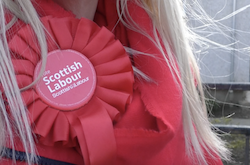VINCE MILLS surveys the state of Scottish politics after May’s Holyrood elections and finds a new political partnership singing the same old tunes on independence. Scottish Labour needs to spell out a radical alternative.
Let’s start with a reminder on how the Scottish parliament looked after the May elections. The Scottish National Party won with 64 seats, the Tories were second with 31, and Labour third on 22, while the Greens took eight and the Liberal Democrats four.
 The SNP were one seat short of an overall majority, a deficiency they have now rectified through their deal with the Scottish Greens – a deal we shall look at briefly a little later.
The SNP were one seat short of an overall majority, a deficiency they have now rectified through their deal with the Scottish Greens – a deal we shall look at briefly a little later.
The broad political context in which that election was fought has not changed much since. Scottish Labour leader Anas Sarwar’s competent performance did nothing to improve his party’s standing. It lost two seats and around 1% of both the constituency and the regional list vote.
Sarwar fought the election on what he correctly argued was a poor performance by the SNP government on health, education and even Covid management, despite Nicola Sturgeon’s absurdly high ratings on that issue. No-one on the left would have argued with his approach nor with Scottish Labour’s manifesto. It was radical.
Like Keir Starmer, however, Sarwar believes that arguing for independence – and therefore for an independence referendum – is a distraction we don’t need. It’s a position that around 50% of the Scottish electorate, many of them former Labour voters, do not accept. Recent Opinion polls show a slight lead for ‘No’ supporters at 52% with ‘Yes’ on 48%.
So what is fuelling the desire for independence?
I think it’s a sense that unseen forces are destroying whole swathes of Scottish society, including its industries and services, and the communities that went with them, and that these are being replaced by a world of precarious employment with diminishing social support and solidarity. That damage is a consequence of globalisation, financialisation and neo-liberalism, which new Labour helped embed in British politics.
So when Scottish Labour argued that the Scottish economy “suffered from low investment and productivity, limited domestic ownership, coupled with labour market inequalities”, and committed to ending the privatisation of services and promoting public ownership, it made little impact on the electorate.
Ownership & control
And yet the question of who owns and controls the economy is central to what is actually happening to Scottish society, jobs and people.
Let’s take a few examples, starting with who owns ‘Scottish’ Power. That’s Iberdrola, a Spanish-registered firm whose largest shareholders are the Emir of Qatar and BlackRock, the world’s biggest investment company. In other words, Scottish Power is controlled by external investors primarily interested in maximising profits. And yet the company will be central to any just transition to a carbon neutral economy and ought to be under public ownership.
Similarly, consider how much Scottish steel was used to build the new Forth Bridge –none. The bridge cost £1.5 billion to construct and the steel was worth £790 million, all of it imported from China, Poland and Spain. Why? Because the SNP claimed that EU state aid rules made it impossible to direct work to Scottish firms.
Incidentally, many of those EU rules have now been carried over into British law through Boris Johnson’s UK-EU Trade and Cooperation Agreement (TCA), agreed last Christmas Eve. And while it is true that the UK escaped the European Court of Justice jurisdiction, the agreement continues to ensure that state aid is heavily policed. In any case, the SNP is committed to returning to EU membership just as soon as it can after independence.
And then there’s McVities. At the start of September there was a debate in the Scottish parliament about the proposed closure of the McVities factory in the east end of Glasgow due to global over capacity, threatening 500 jobs. McVities rejected a £58 million rescue plan offered by the Scottish government.
And who owns McVities? That’s Pladis, a subsidiary of the massive Turkish conglomerate Yilditz, in part owned by private equity company Gözde, which no doubt argued for the fastest possible and biggest return on investment and hence the closure.
The SNP’s response to Pladis’s rejection of its plan was revealing. “Sadly, as is the case with other companies, we cannot force Pladis to maintain a presence in Scotland,” said SNP finance secretary Kate Forbes. “We can only present the most compelling case we can, to persuade them to remain here.”
No sign here of the supposed radical SNP introducing a ‘right to own’ similar to Italy’s Marcora Law, which Scottish Labour had argued for under Richard Leonard. Leonard wanted to introduce a law that would allow workers to buy their companies when they go up for sale or face closure.
False choices
It is probably an appropriate point to have a brief look at the deal made between the Scottish Greens and the SNP. The parties have committed to “a bold, ambitious plan to transform the economy, putting us on the path to meeting our 2030 climate targets, helping restore the natural environment, stimulate innovation, create jobs, improve wellbeing for all, and further embed fair work standards across all sectors of the economy.”
 The deal does not include a commitment to trade union recognition at companies receiving public sector money, only that the organisation concerned “provides appropriate channels for an effective workers’ voice, such as trade union recognition”.
The deal does not include a commitment to trade union recognition at companies receiving public sector money, only that the organisation concerned “provides appropriate channels for an effective workers’ voice, such as trade union recognition”.
Nor does it anywhere commit to public ownership, leading Roz Foyer, General Secretary of the Scottish TUC, to say, “while the policy platform agreed contains welcome gains, it fails to deal with fundamental questions on ownership that are crucial to achieving a real just transition.”
Writing some years ago Professor David Miller made the point that “Scotland is governed not simply via the institutions of formal governance… Scotland is also run by political and economic decision-makers, only some of whom are based in Scotland. Other centres of decision making are obviously London and Brussels, the headquarters of the WTO, IMF and World Bank, and the board rooms of the transnational corporations, including those which have no interest or base in Scotland.”
It is disturbing then, that neither the SNP nor the Scottish Greens address this real threat to Scottish democracy and wellbeing. They argue that changing the system of ‘formal governance’ is the solution to all of Scotland ills. But this helps disguise the who really controls Scottish assets and how they are exploited by the forces of global capital.
Even at the level of formal democracy, opposition to the Tories by all of the main parties in Scotland has been muted on two key measures. The first is the Internal Market Act 2020 which concentrates all powers over state aid and competition policy in the hands of the Westminster parliament – taking away powers delegated to the Scottish parliament by the 1998 Scotland Act.
The second is the Subsidy Control Bill now going through the Houses of Parliament, which “introduces a number of prohibitions to prevent public authorities granting subsidies with distortive or harmful economic impacts”, so protecting competition at the expense of state aid.
At the moment Scotland is being offered a ‘choice’ – one between a British elite using antiquated and undemocratic state machinery to secure continued dominance through centralised state power; and a wannabe elite in the shape of an SNP-Scottish Green partnership of comprador capitalists completely committed to neo-liberal norms. Together they want to ensure that Scotland remains ensnared by the neo-liberal rules of EU and global capital, rather than developing Scotland’s own industrial capacity through public ownership.
Scottish Labour still has time to build support for a radical alternative to independence and the status quo. But it can only do so if it breaks through on the constitutional issue by insisting in any future referendum that a third option be put on the ballot paper, one that demands Scotland is given the necessary means to take its economy into public hands.
That decision lies in the hands of Labour Party conference in September and Scottish Labour conference in March. The outcome of those gatherings will tell us whether Scottish Labour is heading for political revival or political irrelevance. Increasingly, I fear it is the latter.
—-
Vince Mills is secretary of Glasgow Kelvin CLP and a member of the Red Paper Collective.
This article is based on a talk given to an ILP meeting on ‘The future of the union and the case for UK federalism’ held on Zoom on 3 September 2021.


